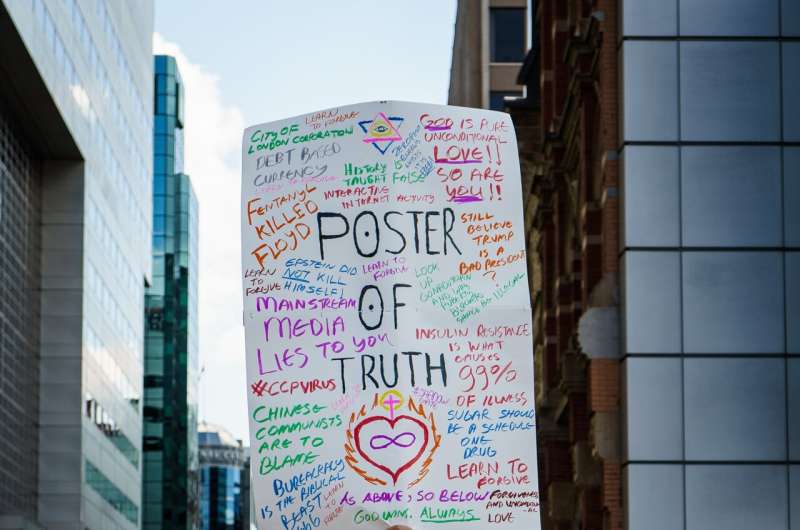This article has been reviewed according to Science X's editorial process and policies. Editors have highlighted the following attributes while ensuring the content's credibility:
fact-checked
peer-reviewed publication
trusted source
proofread
Most existing methods found to be ineffective for counteracting conspiracy beliefs

A new review of previously published studies on methods for reducing conspiracy beliefs has shown that most of these methods are ineffective, but that those focused on fostering critical thinking or an analytical mindset show some promise. Cian O'Mahony of University College Cork, Ireland, and colleagues present these findings in the open-access journal PLOS ONE on April 5.
Evidence from prior studies suggests that belief in conspiracy theories can be associated with harmful consequences, such as—in the case of COVID-19 conspiracies—reduced adherence to public health recommendations. In recent years, behavioral researchers have investigated how to reduce conspiracy beliefs. However, until now, no study has comprehensively reviewed existing evidence for the effectiveness of various approaches.
O'Mahony and colleagues conducted a systematic review to analyze 25 previously published studies, with a total of 7,179 participants, that evaluated various approaches for reducing conspiracy beliefs. For example, some studies employed straightforward counterarguments against conspiracy theories, and others used ways of priming participants to have a more analytical mindset before asking them about their conspiracy beliefs.
The analysis showed that, out of all methods in the 25 studies, only half were associated with any change in participants' conspiracy beliefs, and just a few produced changes of a meaningful size. This suggests that most existing methods for changing conspiracy beliefs are ineffective. Notably, effective interventions tend to be presented to participants before exposure to conspiracy statements, while post-exposure interventions are generally less effective.
The most effective methods were those that drew attention to the factual inaccuracies of conspiracy beliefs prior to presenting participants with conspiracy statements. Another relatively more effective method was a 3-month educational course on differentiating between scientific and pseudoscientific practices. Traditional counterarguments against conspiracy beliefs were some of the least effective methods.
Drawing from their findings, the researchers suggest that future development of methods to counter conspiracy beliefs should focus on fostering critical thinking and an analytical mindset, as well as reaching people before they are exposed to conspiracy theories. They also outline a number of challenges facing such research, such as the need to determine how well different methods might work in the real world outside of a controlled study.
The authors add, "One of the most important findings of our review is that traditional fact-checking and counterarguments are the least effective means of combating conspiracy beliefs. We found that preventative measures, such as exposing participants to counterarguments before they encountered misinformation, were the most effective strategies to challenge conspiracy beliefs. We also found that most interventions would be difficult to implement in real-world settings, which is why we are developing a more viable intervention funded by the Irish Research Council's Enterprise Partnership with Google in the form of a video game."
More information: The efficacy of interventions in reducing belief in conspiracy theories: A systematic review, PLOS ONE (2023). DOI: 10.1371/journal.pone.0280902
Journal information: PLoS ONE
Provided by Public Library of Science




















